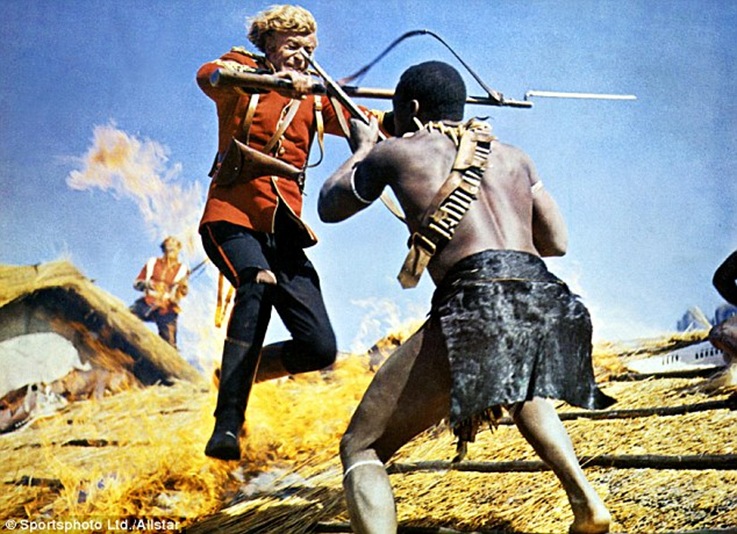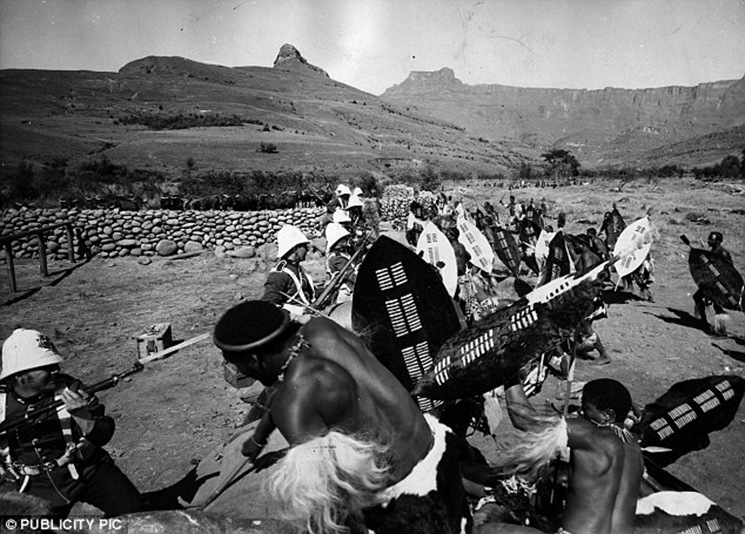Daily Mail
January 3, 2014

The battle is re-fought like no other single incident in Britain’s imperial history. It reappears regularly on television, particularly at high days and holidays. This festive season is no exception.
On our screens, the desperate fight by 140 soldiers to defend Rorke’s Drift, a tiny outpost of Queen Victoria’s empire in the South African veldt in 1879, was re-enacted in that classic British war film, Zulu.
Once again, our blood chilled at the fast-approaching rumble of fists pounding on cowhide shields.
‘Damn funny,’ is the young British lieutenant’s quizzical remark as he looks towards the empty horizon, ‘like a train in the distance . . .’
Then up goes an anguished cry as the enemy suddenly materialises in a vast mass on the surrounding hilltops — ‘Blimey … Zulus … Thousands of ’em …!’
And so the action begins in a film universally (and rightly) hailed for its epic battle scenes and unsurpassed on-screen adventure.
The outcome never changes, but its impact is never dulled as wave after wave of black warriors heroically hurl themselves at barricades manned just as heroically by white men in scarlet tunics and gleaming white pith helmets.
The defenders — outnumbered by more than 25 to one against 4,000 Zulus — fall back, regroup, hold their ground, fight their attackers hand-to-hand to a standstill, and win the day, but only just.
The Zulus finally withdraw, but not before delivering a haunting song in tribute to the courage of the Britons.
Despite the terrible bloodshed, there is honour on both sides — and a lump in the throats of those of us watching this masterpiece of British film-making even for the umpteenth time.
Zulu has the power to grip our attention because it is timeless in theme, look and style — which makes it even more of a surprise that it is half a century old and this month celebrates its 50th birthday.
It opened at the Plaza in Lower Regent Street, London, on January 22, 1964 — the 85th anniversary of the battle it depicted.

Today it is still as fresh as it was for that premiere audience, its wide-screen images of the majestic South African landscape as stunning as ever, its action-packed fight scenes compelling, its human drama absorbing. The cobwebs show only in the opening credit that reads: ‘And introducing Michael Caine.’
Playing Bromhead, one of the two lieutenants who commanded the Rorke’s Drift defence, shot the then little-known Caine into the big time.
He is in his 80s now, with more than 100 films to his credit, but Zulu remains among his most memorable (even if his role as a toff officer was a far cry from the Cockney Jack-the-lad he proved better suited to).
Caine was part of an all-British cast, led by the magnificent home-grown talents of Stanley Baker and Jack Hawkins.
Richard Burton’s voice thundered out the narration. This in itself was noteworthy.
Elsewhere, Hollywood was insisting on catapulting Americans into our war films. The British commandos whose exploits inspired The Guns Of Navarone (1961) somehow needed the help of Gregory Peck, while Steve McQueen and James Garner were incongruous inmates of a British prisoner-of-war camp in The Great Escape (1963).
It would get worse, with whole episodes of Britain’s wars regularly hijacked and Americanised in a way that left British viewers grumbling into their beer about blatant misportrayals of our past.
Even Zulu Dawn, Zulu’s 1979 successor about another battle on the eve of Rorke’s Drift, found a top-of-the-bill role for an imported Burt Lancaster.
But Zulu itself stuck resolutely to its historical integrity, one of the last blockbusters of its kind to dare to exclude American stars from what was essentially a British story.
It helped that director Cy Endfield had been forced out of his American homeland. Blacklisted by Hollywood in the Red-baiting Fifties because of alleged communist sympathies, he found refuge in the United Kingdom.
